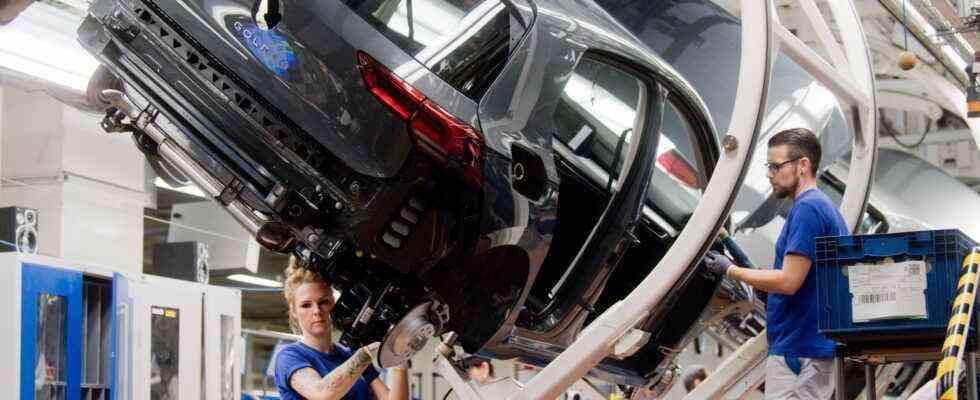Status: 02/08/2022 08:27 a.m
Millions of people received short-time work benefits during the pandemic. Experts consider it a model for success in the crisis – and yet see a need for reform
It is the tried-and-tested instrument for cushioning the serious consequences of Corona for companies and the labor market. According to calculations by the trade union research institute IMK, six times as many jobs could be saved at the peak of the pandemic as during the financial and economic crisis of 2009. In April 2020, around six million employees subject to social security contributions received short-time work benefits.
This is how short-time work works
Short-time work is intended to at least partially compensate for the loss of earnings for employees. With simplified access to short-time work benefits, any company with at least one employee with a loss of work of ten percent can apply for it. This rule has been extended to March 31st. In the first three months, the benefit is 60 percent for employees without children and 67 percent for employees with children of the lost net salary in the entitlement period.
For employees who lose at least half of their income, the short-time allowance increases to 70 percent or 77 percent from the fourth month. From the seventh month it is 80 percent or 87 percent for households with children. All employees who are insured under unemployment insurance are eligible.
The simplified rules for short-time work were recently extended again. Federal Minister of Labor Hubertus Heil from the SPD announced that companies can still apply for short-time work benefits under easier conditions until the end of June. Companies from the event and catering industry in particular should benefit from this.
But as much as the model has proven itself – with a view to future economic crises, labor market experts are in favor of reforming some aspects of short-time work.
“Administrative effort too high”
Employment agency boss Detlef Scheele also considers short-time work to be the most important anchor of stability in the German economy in the crisis. At the same time, he sees some problems: it is a complicated instrument with high administrative costs.
“We now have to carry out a final calculation for every company that has worked short-time,” says Scheele. It is checked again whether the company’s documents were error-free and whether the payments to the companies were made properly. “This means that companies and employment agencies will receive around one million final invoices into the coming year. We have to check every single employee carefully,” explains Scheele.
Are low earners disadvantaged?
Enzo Weber, an expert at the Institute for Labor Market and Vocational Research (IAB) in Nuremberg, sees shortcomings that primarily affect low earners. Weber sees one of the biggest problems in the fact that short-time work benefits are increased depending on the period of entitlement. The payments are only increased from 60 percent of the lost net salary to 70 percent or even 80 percent if an employee takes short-time work for the fourth or seventh month in a row. As a result, numerous professional groups could not benefit from this regulation.
“Employees who work in the hospitality industry, for example, and whose business depends on the length of the lockdowns, are usually not on short-time work for seven months at a time,” says Weber. “They do not therefore meet the criteria for increasing short-time work benefits.”
Even mini-jobbers or the self-employed are often not taken into account in this regulation. Since these often work in companies without a collective agreement, according to Weber, they cannot hope for an increase in short-time work benefits from the employer, which the unions have negotiated in crisis collective agreements.
In this context, Weber proposes a staggering that is based on the salaries or the qualification efforts of the employees. He also thinks it is necessary to include mini-jobbers and the self-employed in statutory unemployment insurance and to increase the tariffs for short-time work benefits for low earners. The traffic light coalition has already announced that it will focus in particular on new regulations for people with low incomes after the corona pandemic.
Risk of free-rider effects
Sebastian Link, labor market expert at the Munich ifo Institute, sees another danger: “In many areas, the short-time allowance creates incentives for deadweight gains, which subsidizes companies without having an effect on layoffs,” says Link. A recent study has shown that companies that were already in difficulties before the crisis went on short-time work disproportionately often. The result of the relaxed rules and the extension of short-time work benefits could be that the problems of these companies would be postponed rather than solved.
Overall, the ifo expert also considers the short-time work allowance to be a successful model in the pandemic. A major advantage is that it was already established beforehand and companies could therefore be relieved comparatively quickly. Delays due to processing backlogs at the Federal Employment Agency are usually much less serious than the sometimes very sluggish payment of bridging aid, from which, according to Link, a large number of companies have suffered.
But after the pandemic, Link also believes, it should be considered whether the aid for companies could not be less complicated – in order to make the short-time work model even more crisis-proof.

